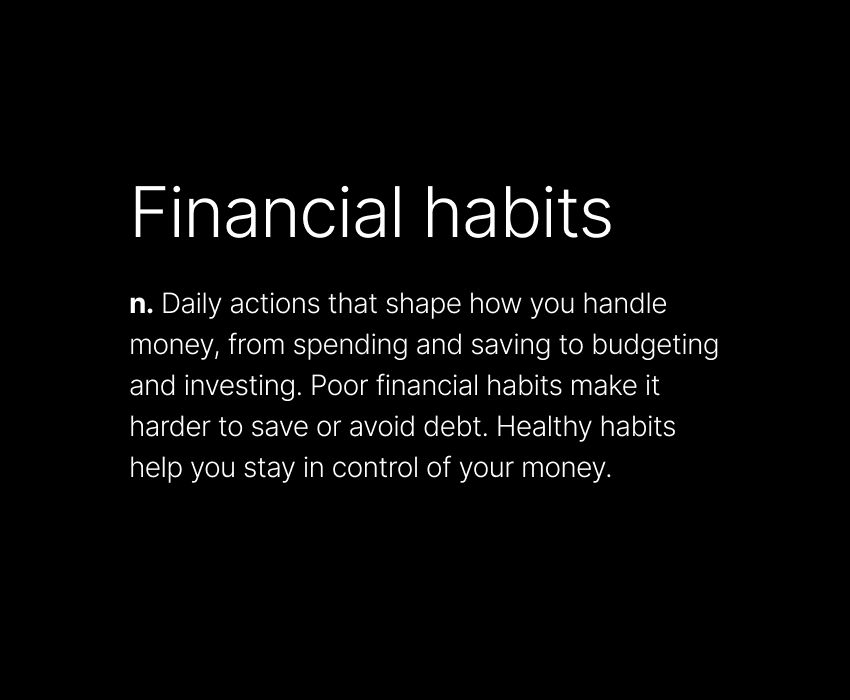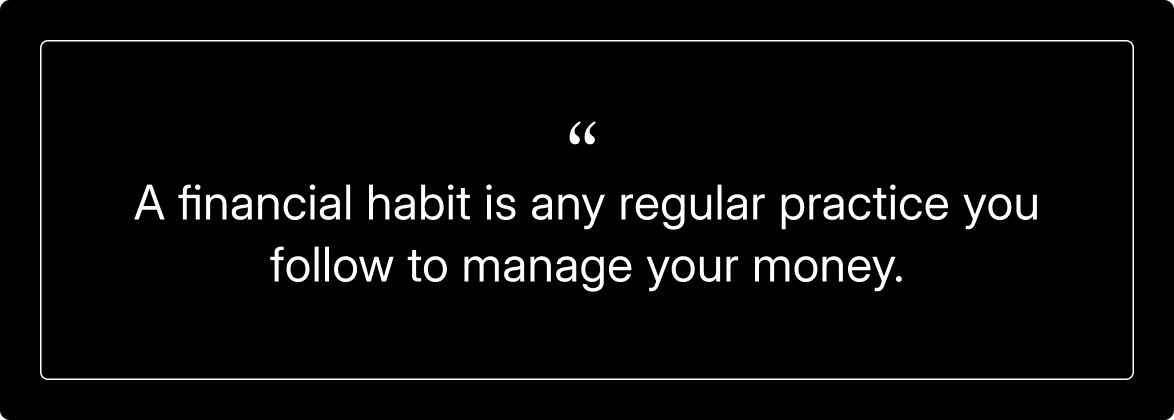Good financial habits are the key to managing your money effectively and creating long-term stability.
By making budgeting, saving, and mindful spending part of your routine, you can reduce stress, gain better control of your finances, and work toward meaningful goals.
Understanding what financial habits are

Healthy financial habits are the daily actions that shape how you handle money — everything from spending and budgeting to investing.
Small behaviors, like impulse shopping or ignoring expense tracking, can snowball over time and make it harder to save or avoid debt.
On the other hand, habits like reviewing your bank statements or setting goals can transform your financial health.
The first step is to recognize where your habits stand today and where you can improve.
The impact of financial habits
Your financial habits impact more than your bank account. They influence your ability to cover emergencies, plan for major milestones, and achieve the life you want.
Good habits put you in charge, while poor habits can hold you back. By understanding how daily decisions can affect your financial future, you can become empowered to make choices that align with your goals, whether paying down debt, planning for large purchases, or investing in what matters to you.
Essential financial habits for everyday life

Incorporating simple financial habits into your daily routine can help you manage expenses, reduce stress, and make steady progress toward your goals.
Create a budget that works
A solid budget is your roadmap to financial success. By tracking your income and expenses, you can ensure that your spending aligns with your priorities. Categorizing your expenses and setting limits can also help you avoid overspending and budget money towards your goals or investments.
Albert makes budgeting simple and easy with automation. You can use the app to create a custom budget, sort your transactions, and track bills — all in one place. Having clear visibility of exactly where your money is going can help you make informed choices and adjust your spending as needed.
Save regularly and consistently
Saving consistently is another important habit. Whether you’re building an emergency fund, saving for a home, or planning for retirement, setting aside money regularly makes a big difference.
Keep in mind that even small amounts add up over time, especially with compound interest, so don’t be disheartened if you can only save a little of your income.
Manage debt wisely
Debt doesn’t have to hold you back — managing it effectively can improve your financial wellness and reduce stress. Proper debt management involves knowing your loan terms, paying on time, and prioritizing high-interest debts. Avoiding unnecessary borrowing and staying on top of payments can save you money and reduce financial stress.
By integrating debt management into your overall financial plan, you can free up extra resources for investing, and building the future you want.
Long-term financial habits
Building long-term financial habits is key to achieving your future goals, like planning for retirement, growing your investments, and preparing for life’s unexpected moments. Budgeting and forecasting your finances can help you reach financial security.
Plan for retirement early
The earlier you start saving for retirement, the more you benefit from compound interest — where your money earns interest on interest.
Even small, regular contributions to your retirement savings can add up over time, setting you up for a more comfortable future.
Invest for your goals
Investing is one of the most effective ways to grow your wealth. By diversifying your investments — spreading your money across different assets — you can balance risk while still positioning yourself for growth. The key is to align your strategy with your risk tolerance and long-term goals.
Albert makes investing more approachable, even if you’re just starting. With easy-to-use features, you can invest regularly and build momentum toward significant financial growth.
Establish an emergency fund
Life happens, and an emergency fund keeps you prepared. Whether it’s an unexpected medical bill or job loss, having three to six months of living expenses saved up can help you avoid needing to rely on credit or loans in tough times.
Scheduling regular contributions lets you start building a safety net without needing to think about it every month. An automatic transfer of a set amount into a savings account removes the pressure and helps you be more consistent in your efforts.
Setting a dedicated savings goal also helps you understand how much you need and what it will take to get there.
How to develop positive spending habits
Developing positive spending habits means making thoughtful decisions, saving where you can, and ensuring your purchases align with your goals. It comes down to understanding your priorities and spending as intentionally as possible.
Differentiate wants from needs
Knowing the difference between wants and needs is the first step to smarter spending. Needs — like rent, utilities, and groceries — are essentials.
Wants, like dining out or new gadgets, are extras that can often be skipped or postponed.
Practice mindful spending
Mindful spending is all about being intentional. Before making a purchase, you can ask yourself questions like: “Do I need this? Does it bring value? How does it fit my financial goals?”
This approach can help curb impulsive buying and free up money for what matters most to you.
Take advantage of rewards and discounts
Using rewards programs and discounts is an easy way to make your money go further. Whether it’s cash back, loyalty points, or discounts on essentials, being strategic about these opportunities can add up over time.
Strategies to improve your financial habits
Improving your financial habits starts with having a clear plan and regularly checking your progress. These strategies can help you stay focused and achieve better outcomes.
Set clear financial goals
Specific, measurable goals can give you direction and keep you motivated. Whether you want to pay off your debt, save for a home, or achieve financial freedom, clear goals can help turn your aspirations into actionable steps.
Writing them down and breaking them into smaller milestones will make your success more attainable.
Track your progress
Monitoring your financial progress can keep you accountable and help you adjust as needed. Regularly review your goals, debt, and spending habits to understand what’s working and where you can improve.
Albert simplifies this with real-time transaction monitoring. From spending breakdowns to cash flow analysis, Albert can give you a clear view of your financial standing so you can make informed decisions at every step.
Overcoming common financial challenges
Building good financial habits isn’t always easy. Two common hurdles — unexpected expenses and staying motivated — can derail your progress, but having a plan can make all the difference.
Dealing with unexpected expenses
Life is unpredictable. A sudden car repair, a medical bill, or an urgent home fix can derail your budget if you’re not prepared. Unexpected expenses can be stressful, but having a plan in place can minimize their impact and reduce financial anxiety.
Regular, consistent saving, no matter how small, creates a safety net so you’re more prepared when surprise expenses arise. With an emergency fund, you’ll be less likely to need to dip into your day-to-day budget or rely on credit for unplanned costs.
Staying motivated and consistent
Financial goals, whether paying off debt, saving for a big purchase, or investing for the future, take time and commitment. Building and maintaining healthy financial habits that will help you reach your goals is not always easy.
However, there are ways to stay focused. For example, celebrating your wins, like reaching a savings milestone or paying off a percentage of debt, can help keep you motivated and focused on the bigger picture.
Reminding yourself of your goals with a picture or a quote can also help you keep your eye on the prize.
Simple habits for building financial well-being
Strong financial habits are the foundation of a secure and stress-free future. By improving your daily money behavior, you can take better control of your finances and confidently work toward your goals.
Getting and staying on track involves setting clear goals, tracking your progress, and tackling financial challenges with a strong plan. With budgeting tools like Albert, building smart financial habits becomes simple and automatic — helping you turn daily actions into lasting success.
⚡️Try Albert today and start building better financial habits for your future.
